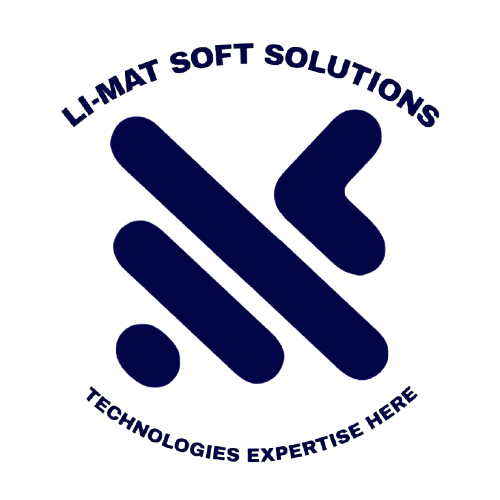Master the art of web development with Node JS. Learn Node and Express fundamentals, Asynchronous Programming, REST APIs, GraphQL, Microservices, Mongo DB, Socket, and more.
- Expert-led interactive sessions.
- 50+ hours of dedicated learning.
- Real-world projects and Certifications.
- 24/7 Support Group
Overview:
LI-MAT Soft Solutions' Node.js certification course is designed to introduce students to the powerful world of Node.js, a runtime environment that has revolutionized server-side and networking applications development. In today's fast-paced digital landscape, having the skills to create efficient and scalable applications is essential, and Node.js is at the forefront of this technological evolution. Our comprehensive course caters to seasoned developers looking to enhance their skills and newcomers eager to explore the world of server-side development. This course provides an in-depth exploration of Node.js fundamentals, covering essential topics such as what Node.js is, why it's significant, and how to get started with Node.js by installing it. We will delve into the core modules included with Node.js, such as buffer, fs (file system), HTTP, os (operating system), path, util, and URL, and explore how these modules can be harnessed to build robust applications. Throughout this course, you will focus on gaining practical experience by working on assignments and hands-on projects, helping you to apply your knowledge in real-world development scenarios. You will understand how to create web servers using the Express framework, handle routes effectively, and deploy applications using tools like PM2 and Nginx. Our expert instructors, who bring a wealth of industry experience, will guide you through the learning process, ensuring you have a solid foundation in Node.js development. Upon completing this course, you will receive a Node.js Development Intern Certificate from LI-MAT Soft Solutions, validating your proficiency in building efficient and scalable server-side applications with Node.js. Whether you aspire to kickstart a career in server-side development, expand your programming skills, or deepen your understanding of Node.js, this course offers a tailored learning path for all levels of learners. Join LI-MAT Soft Solutions and embark on a journey to harness the full potential of Node.js in server-side and networking application development.
Prerequisites: This course is suitable for beginners who understand web technologies like HTML, CSS, and JavaScript. No experience with Node.js is required, making it accessible to individuals looking to explore server-side development for the first time.
- Expert-Led Live Interactive Sessions.
- 60+ hours of dedicated learning.
- Regular Assignments.
- Assessment (Quiz/Test).
- WhatsApp Support Groups.
- Class Recordings.
- Internship Grade projects and certification.
- Full-Stack Developer
- Backend Developer
- Node.js Developer
- Web Application Developer
- API Developer
- DevOps Engineer
- Solutions Architect
Upon completion of this Node.js Certification course, you will be able to:
- Understand the fundamentals of Node.js and its role in modern web development.
- Implement asynchronous programming in Node.js, including callback functions and event-driven architecture.
- Explore the built-in Node.js modules like buffer, fs, http, os, path, util, and url.
- Create and manage your own Node.js modules and packages.
- Work with the Node Package Manager (NPM) to install and manage third-party packages.
- Build a basic HTTP server and client-side applications.
- Understand the concepts of event-driven programming and use EventEmitters to send and receive events.
- Define routes and create a web server with Express Framework.
- Deploy Node.js applications using PM2 and Nginx for production-ready solutions.
- Implement asynchronous programming concepts, including the call stack, callback functions, and the event loop.
- Integrate MongoDB, a NoSQL database, into your Node.js applications.
- Learn to send emails through your Node.js application using SendGrid.
- Develop REST APIs with Express.js and interact with them using tools like Postman.
- Gain an understanding of GraphQL and use GraphQL Playground for API testing
- Implement user authentication and explore different authentication methods.
- Develop a microservices application and understand the concepts of microservices architecture.
- And More.
Why Learn Node JS?
Enrolling in the Node.js certification course with LI-MAT Soft Solutions opens the doors to a world of exciting possibilities in web development. It equips you with the essential skills to succeed. Here are compelling reasons why you should embark on this learning journey:
- Leading multinational corporations, including Netflix, Trello, PayPal, LinkedIn, Walmart, Uber, Twitter, Yahoo, eBay, and many others, leverage Node.js for constructing highly scalable network applications.
- You can benefit from Government of India (GOI) incentives of up to Rs 14,500* upon successfully passing the mandatory NASSCOM Assessment.
- According to Glassdoor, the average income annually for a Software Engineer specializing in Node.js is ₹5,49,377 in India. Additionally, the typical extra cash compensation for a Software Engineer NodeJS in India amounts to ₹43,361, with a salary range spanning from ₹10,000 to ₹76,255.
- High Demand in Industry: Node.js is among the most sought-after skills in the web development industry. By mastering Node.js, you position yourself as a desirable candidate for established tech giants and innovative startups.
- Versatile Application: Node.js is renowned for its versatility. It can be used to develop various applications, from server-side web applications to real-time applications and APIs.
- Scalability: Node.js is designed for building scalable network applications. Learning Node.js enables you to efficiently create applications that can handle large numbers of simultaneous connections.
- Efficiency: Node.js is known for its non-blocking, event-driven architecture. It allows you to write highly efficient and responsive code, making it ideal for applications requiring real-time updates and interactivity.
- Thriving Community: Node.js has a vibrant and supportive online community. You'll have access to many resources, including extensive documentation, forums, and libraries, which can significantly aid your learning journey.
In conclusion, embarking on the Node.js certification course empowers you with the knowledge and expertise to excel in web development, opening up exciting career opportunities in a consistently high-demand field. Whether you are a newcomer or an experienced developer, Node.js equips you with a valuable skill set to thrive in the ever-evolving web development landscape.
Skills Covered:- Node.js Framework
- Asynchronous Programming
- Building Node.js and Express.js Applications
- GraphQL
- Connecting MongoDB to Node.js
- Working with Rest APIs
- Deployment
- Testing Node.js Applications
LI-MAT Soft Solutions Node JS Training Description
Who should enrol in this training program?The Node.js course is designed to cater to a diverse audience of professionals looking to elevate their web development skills and build powerful server-side applications. This training program is particularly well-suited for:
- Web Development Enthusiasts: Individuals new to web development aspire to become proficient in building server-side applications using Node.js.
- Frontend Developers: UI/UX developers keen on expanding their skill set to encompass server-side development with Node.js.
- Web Developers: Seasoned web developers seeking to enhance their expertise in frontend technologies and broaden their horizons by delving into server-side scripting.
- Software Developers: Those interested in bolstering their toolkit by incorporating Node.js, enabling them to create modern and scalable web applications.
- Framework Migrators: Developers transitioning from other UI JavaScript frameworks, such as Angular or Vue, and wish to explore Node.js's capabilities for server-side development.
In summary, this training program is inclusive and suitable for professionals looking to harness the power of Node.js to build efficient and scalable server-side applications. Whether you're a beginner or an experienced developer, this course offers valuable insights and hands-on experience in Node.JS.
Node.JS streamlines App Development with its non-blocking, asynchronous architecture, facilitating faster execution, real-time capabilities, and enhanced scalability for robust and responsive applications. Li-Mat Soft Solutions provides training on App development and Software Development also.
How Can Novices Get Started with Node.js?
Node.js is an approachable framework, making it particularly accessible for beginners. To gain proficiency in Node.js and comprehend its capabilities, proper guidance and a structured learning pathway are essential. Those new to web development with a keen interest in building their career using Node.js can kickstart their journey by enrolling in our training program, where they can earn certificates to validate their expertise in this field.
What Is Node.js, and How Is It Utilized?Node.js, sometimes known as Node, is an open-source runtime environment for executing JavaScript code on the server. It was created to extend the use of JavaScript beyond the web browser and enable developers to build scalable and efficient server-side applications. Node.js is highly regarded in the software development community for its versatility and performance.
Node.js finds its applications and advantages in various scenarios:
- Server-Side Development: Node.js is primarily used for building server-side applications, including web servers and APIs. It allows developers to create efficient, non-blocking, and event-driven servers, making it ideal for handling concurrent connections and real-time applications like chat applications or online gaming.
- Scalability: Node.js excels in building scalable applications, thanks to its asynchronous and non-blocking nature. It can efficiently handle a large number of simultaneous connections, making it suitable for applications with high traffic.
- Build Tools: Developers often use Node.js to create build tools and automation scripts for their projects. Popular tools like Webpack and Gulp are built using Node.js.
- RESTful APIs: Node.js is a popular choice for creating RESTful APIs due to its lightweight and fast nature. Many web and mobile applications use Node.js for their backend API services.
- Real-Time Applications: Node.js is favoured for real-time applications such as chat applications, online gaming servers, and collaborative tools, where low latency and high performance are crucial.
- Microservices: Node.js is well-suited for developing microservices architectures, enabling the creation of small, independent services that work together to build complex applications.
In conclusion, Node.js extends the capabilities of JavaScript to server-side development, making it a versatile and powerful tool for various applications. Its non-blocking architecture, speed, and vibrant ecosystem of packages and libraries have made it a go-to choice for modern web and server development.
Which Companies Are Hiring Node.js Experts?In today's technology-driven landscape, Node.js experts are in high demand across various industries. Businesses are increasingly recognizing the advantages of Node.js for building scalable and efficient server-side applications. Here's a list of prominent companies actively recruiting Node.js professionals:
- Accenture
- Tata Consultancy Services
- Freelancer
- PayPal.
- Netflix
- Uber
- Walmart
Learning Node.js can be swift and accessible if you have a foundational understanding of programming and are familiar with JavaScript. Enrolling in our Node.js course can provide a valuable career-enhancing advantage and help you achieve a promising career in Node.js Development.










